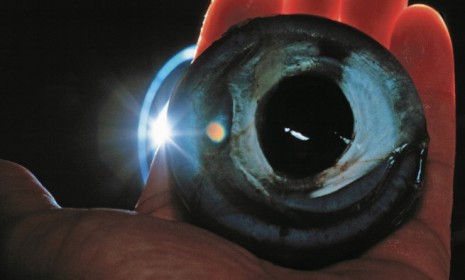Why giant squids have enormous eyes
The tentacled invertebrate boasts the largest eyes of any known animal — a trait scientists are crediting to an age-old, deep-sea foe

A free daily email with the biggest news stories of the day – and the best features from TheWeek.com
You are now subscribed
Your newsletter sign-up was successful
The disproportionately large eyes of the giant squid have long been one of the creature's more confounding attributes. And now, researchers are positing that the unusually large eyeballs are an evolutionary response to one of the invertebrate's most long-standing enemies — the fearsome sperm whale. Read on:
How large are these eyes?
The squid's eyes can be the size of basketballs — larger than those of any known animal — and the creature itself can grow up to 46 feet long and weigh as much as five adult men. Similarly sized animals, such as whales and swordfish, have eyeballs that max out at just 3 inches in diameter.
The Week
Escape your echo chamber. Get the facts behind the news, plus analysis from multiple perspectives.

Sign up for The Week's Free Newsletters
From our morning news briefing to a weekly Good News Newsletter, get the best of The Week delivered directly to your inbox.
From our morning news briefing to a weekly Good News Newsletter, get the best of The Week delivered directly to your inbox.
And what did researchers discover?
That the eyes are not only unusually large, but surprisingly precise. A new study, published in the journal Current Biology, explains that the colossal squid's eyes are capable of taking in much more light than the eyes of other large sea creatures. The team thinks this may be an evolutionary response to the squid's main predator, the sperm whale.
Why is that?
Giant squids, which typically live a dim existence 2,000 feet under the ocean's surface, comprise three-fourths of the sperm whale's diet. The sperm whale uses loud clicks, or sonar, to find prey, and the squid is deaf. The theory goes that a squid with superior light-collecting eyes is able to detect faint bioluminescence from tiny plankton disrupted by approaching whales, "and use its jet propulsion to make a quick escape," says Nell Greenfieldboyce at NPR. The bigger its eyes, the more likely a squid is to survive and pass along its genes — which, over many, many generations, resulted in today's squids with enormous eyes.
A free daily email with the biggest news stories of the day – and the best features from TheWeek.com
Sources: Fox News, NPR, The State Column, Wired
-
 Growing a brain in the lab
Growing a brain in the labFeature It's a tiny version of a developing human cerebral cortex
-
 How are Democrats trying to reform ICE?
How are Democrats trying to reform ICE?Today’s Big Question Democratic leadership has put forth several demands for the agency
-
 Silicon Valley: Worker activism makes a comeback
Silicon Valley: Worker activism makes a comebackFeature The ICE shootings in Minneapolis horrified big tech workers